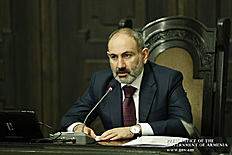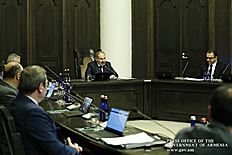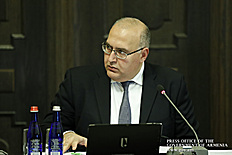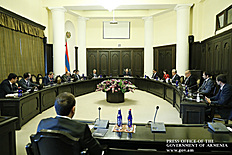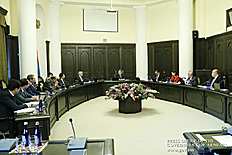Press releases
PM: “The Commandant’s Office will impose minimum safety standards for economic entities’ operations”
more 2 photos
Chaired by Prime Minister Nikol Pashinyan, a regular consultation was held in the Office of Government to discuss the Government’s anti-crisis policy aimed at curbing the coronavirus-driven pandemic’s adverse consequences.
Prior to the discussion, the Prime Minister noted:
“At the outset of the coronavirus crisis, many in the world and in Armenia thought that we could quickly and efficiently solve specific problems, since we hoped to be in for a short-lived crisis. The time has come to acknowledge that we will have to co-exist with the COVID-19 for at least the coming year. This means that we need to shift from tactical and short-term ideas to long-term and strategic ones. We must tell the public that we will have to put up with the coronavirus at least for the coming year.
The first step is to adapt ourselves and society to living under new conditions with the understanding that this carries certain risks from an epidemiological point of view. To organize normal life and work in these conditions or in accordance with the new circumstances, we must be able to develop new rules of behavior, acquire new behavioral reflexes in everyday life and in economic activity. This is probably the most important task.
Our strategy and tactics are as follows: in the near future, before the end of the established state of emergency, we must open all areas of economic activity, but at the same time the Ministry of Healthcare, the Government, the Commandant's Office must impose minimum safety standards for economic entities’ operations.
This is not an easy task because we may face new outbreaks if we fail to demonstrate high responsibility and discipline. Our task is to ensure that new outbreaks of the epidemic do not force us to return to strict restrictions, because, firstly, it will be more difficult to withstand, and secondly, it will be more stressful and painful for the economy and society.
We need to switch over from the logic of step-by-step, tactical and momentary decisions to the logic of long-term and strategic tasks just as we had originally planned.
To put it in financial terms, we have decided to implement emergency programs and measures worth 150 billion drams, of which 25 billion drams will go to social assistance, 25 billion - to economic assistance, 80 billion drams should become our strategic contribution to economic reforms, and 20 billion drams will constitute our reserve fund for use in any direction.”
Issues related to the process of implementing programs of socio-economic assistance to mitigate the problems arising from the coronavirus, intermediate results, tools to expand support and the scope of beneficiaries were discussed during the meeting. A number of proposals and ideas were voiced in this context.
